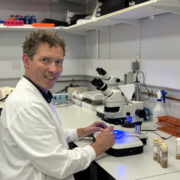Identifying existing drugs to repurpose for treating Ataxia-Telangiectasia
Research Project information
Principal researcher: Dr Richard Tuxworth
Institute: University of Birmingham, UK
Cost: £249,332.20 over 32 months in partnership with The A-T Society (UK), AEFAT (Spain) and BrAshA-T (Australia)
Start Date: 1st of November 2024
What are the researchers proposing to do?
Children with A-T have poorly coordinated movement because nerve cells in one part of the brain start to malfunction and eventually die. It is thought that a particular process known as autophagy is defective in the A-T nerve cells. Autophagy is how cells recycle materials and old components for re-use. This recycling process is known to be defective in almost every form of neurological disease, including in other rare inherited disorders affecting the nervous system. Many existing drugs are known to increase the levels of recycling in cells. In this project they are going to search the collection of drugs to try to identify one or more that can restore recycling in A-T nerve cells with the hope that these drugs could be re-purposed to treat patients.
Why?
In almost every inherited neurodegenerative disorder where researchers have looked, the recycling process is disrupted. The team at Birmingham are already growing nerve cells in their laboratory for two other inherited neurodegenerative disorders and they see defective recycling. Importantly, treating the nerve cells with drugs that restore recycling can prevent premature death in both cases and they think this may also work for nerve cells from A-T patients. If they show this to be true, the drugs would be candidates to test rapidly to see if they can help prevent or slow down neurological symptoms in A-T patients.
How will the research be done?
In this project they first will grow A-T nerve cells in the laboratory and test a collection of the drugs that are known to enhance recycling. If some look promising, they will then test them in two more complex models of A-T. First, they will use fruit flies that have been engineered to mirror what happens in A-T. Fruit flies, while much more simple than humans, have a complex nervous system and show complex behaviour. They will be looking to see if any of the drugs correct the structural changes to nerves that they see in their A-T flies that are due to defective recycling. They will also test if the drugs are able to correct the movement deficits the flies show.
In the final stage of the project, they will grow mini-brains in the laboratory. Over many weeks these mini-brains – known as organoids – develop into complex 3D structures with many different types of cells and features reminiscent of a brain. They know already that in brain organoids grown from A-T cells the genes associated with the autophagy recycling process are not being turned on and off correctly and that there is increased death of nerve cells. The team are hoping that the drugs shown to work in the cells and the fruit flies will be able to reverse the defective recycling in the brain organoids and protect the nerve cells from dying.
How could it make a difference in the lives of those affected by A-T?
The drugs they will test have been deliberately selected to make it quicker and simpler to move into early-stage clinical trials. All the drugs are old and commonly used, meaning they are cheap with no patent issues, plus their safety profiles and any possible side-effects are well-understood. Importantly, all are known to get into the brain and several are already used to treat neurological conditions, including childhood-onset conditions such as epilepsy. If they can see positive effects of one or more drugs in their cells, fruit flies and mini-brains, they would be excited to get to the next stages: clinical trials to test if they are able to help A-T patients maintain neurological function for longer.





